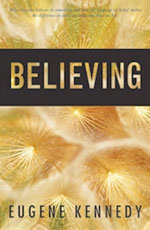Eugene Kennedy is professor emeritus at Loyola University, Chicago. He has written more than 50 books on psychology and religion and currently has a regular column in the National Catholic Reporter.
The subject of belief has been in the news lately with atheists and Christians squaring off against one another. Kennedy writes in the introduction: "I think that the belief needs of men and women run painfully deep and that the church must not retreat into a comforting past, but rather proceed into the future seeking a better understanding of what it believes so that it can provide the sacramental environment and the human community in which faith can come vigorously to life for believers."
The mysteries of human existence and the difficulties we have in talking about them cause many people to look for meaning in myths. Kennedy sees believing as a major dimension of what it signifies to be human. Having faith in Jesus and in the incarnation enables Christians to embrace life in its fullness and refuse to spend time thinking about escaping to Heaven. The author refuses to demonize doubt and agrees with Paul Tillich who saw it as a natural part of the experience of faith.
Believing is, according to Kennedy, a function of the whole person and is best seen as a movable feast. Faith is not a fixative; it is a creative process that draws out the best in us. The author ends with a list of what he believes in. Readers will enjoy comparing their own list with his.
